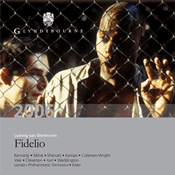As if this were not enough, the opera is
also Beethoven’s political testament, an attack on tyranny and injustice
initiated (quite literally) with a trumpeted call to arms for the forces of
truth and fraternity. Fortunately, this confused (and some might argue,
irreconcilable) juxtaposition of genres contains some of the composer’s
most beautiful music, and lovers of the work will undoubtedly welcome these two
recently released recordings of Beethoven’s only completed opera. Both
performances date from 2006: an audio recording of a Glyndebourne production
featuring Anja Kampe, Torsten Kerl, and the London Philharmonic conducted by
Mark Elder, and a filmed performance (celebrating the opening of the new Palau
de les Arts of Valencia) with Waltraud Meier and Peter Seiffert accompanied by
the Community Orchestra of Valencia under Zubin Metha.
A comparison of these two productions — one a two CD set, and the
other a DVD — while inherently unfair, is revealing. From the first notes
of the overture it is obvious that the Gyndebourne production features the
better orchestra and more inspired conductor: throughout the performance
Elder’s direction of the LPO is a heavenly delight. This is not meant as
a criticism of Maestro Mehta, however, who still manages to create some
powerful moments while working with a much younger and less accomplished
orchestral ensemble. It is particularly regrettable that, unlike the Valencia
version, the Glyndebourne production does not include a performance of the
third Leonore overture before the second act finale (a tradition,
begun by Mahler in Vienna, which Metha wisely follows). The Gyndebourne
recording also features the better chorus (prepared by Thomas Blunt) —
“O welche Lust” is sung with excellent diction, wonderful dynamic
contrast, and superior balance by the British troupe. Elder’s direction
of the LPO in the performance of the Haydenesque introduction to the chorus is
unforgettable.
Waltraud Meier is a dynamic and powerful presence as Leonore, and her
considerable talents are fully utilized in the Valencia production. The
contrast between the vocal styles of Meier and Kampe is nowhere more evident
than in “Mir ist so wunderbar” — Meier’s tone is
commanding and mature, whereas Kampe’s seems less so. This comparison
holds throughout the performances: Meier is simply more convincing and at ease
in the showcase arias and duets. Her performance of “O namenlose
Freude!” with Seiffert is remarkable, and is undoubtedly the happy result
of their frequent collaboration together in other roles (most recently in the
Met production of Tristan). Seiffert is less compelling when Meier is
not on stage, however. Torsten Kerl’s Florestan is more endearing: the
youthful tenor’s rendition of “Gott, Welch Dunkel hier” is
athletic and impassioned, and made all the more enjoyable by the special
touches added by the London Philharmonic’s wonderful accompaniment.
In the secondary roles each performance offers some special moments. Matti
Salminen is surpisingly comfortable in his role as Rocco, and even pulls off
the notoriously awkward “Hat man nicht auch Gold beineben” aria
beautifully. While the voice is at times strained and raspy, his expressive
presence, particularly in ensemble numbers, elevates the performances of his
fellow cast members. Brindley Sherratt’s Rocco is adequate in the
Glydnebourne version, but little more. Lisa Milne is impressive as Marzelline,
and displays an enthusiasm for her role which IldikÛ Raimondi seems not to. The
rising Finnish star, Juha Uusitalo is an impressive and menacing Don Pizarro
(seeing him interact on stage with fellow-Finn Salminen in the “Es
schl‰gt der Rache Stunde” is a real treat), and Rainer Trost is a far
more convincing and lyric Jaquino than Andrew Kennedy, whose voice seems forced
and pinched throughout much of the performance.
Pierluigi Pier’Alli’s direction of the Valencia version features
some fascinating video effects. His creative use of the motif of chains and
prison bars (projected onto the screen on stage) which leads to
Florestan’s aria to open Act II is highly effective. Despite this, some
may find his otherwise rather conservative approach to much of the rest of the
work a trifle dull, and it is unfortunate that Deborah Warner’s edgy
Glyndebourne production can only be seen in a few photos in the album notes.
One welcomes Pier’Alli’s willingness to allow Meier an opportunity
to explore the full range of her dramatic abilities, particularly during the
prisoner’s chorus, where the soprano wanders the stage in a futile search
for Florestan — an unforgettable effect which she brings off
beautifully.
Because of the merits of each performance it is difficult to choose between
these two recordings. The Glyndebourne version is dynamic and more aurally
pleasing, but the added visual dimension of the Valencia recording is quite
powerful. Certainly, newcomers to Fidelio will appreciate the DVD
version more than a sound recording, even a relatively good one. I suspect that
those who already know the opera well will enjoy both of these new issues
— each performance brings out different facets of the work, an opera
which, despite its many flaws, remains one of the most enjoyable products of
Beethoven’s genius.
Donald R. Boomgaarden
Dean of the College of Music and Fine Arts
Loyola University New Orleans
image=http://www.operatoday.com/Medici_2072498.gif
image_description=Medici Arts DVD 2007
product=yes
product_title=Ludwig van Beethoven: Fidelio
product_by=Carsten Stabell; Juha Uusitalo; Peter Seiffert; Waltraud Meier; Matti Salminen; IldikÛ Raimondi; Rainer Trost; Javier AgullÛ; Nahuel di Pierro; Cor de la Generalitat Valenciana. Orquestra de la Comunitat Valenciana; Lorin Maazel, Music Director. Zubin Mehta
product_id=Medici Arts 2072498 [DVD]
price=$26.99
product_url=http://astore.amazon.com/operatoday-20/detail/B001QUL6WO
